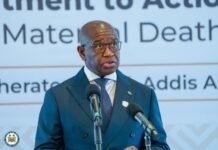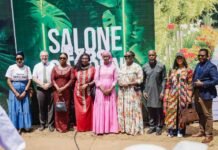By Mariama Sowe
Communication, trade, education, politics, and almost all aspects of our lives now heavily rely on technology and the internet, which is often touted as making life easier. However, this same technology has also provided a new “faceless forum” for harassment against women and girls – especially women working in public-facing positions –causing growing concern over the rise of Online and Technology-Facilitated Gender Based Violence (TFGBV) all over the world, and Sierra Leone is no exception.
The international rights-based group, Internet without Borders, estimates that 45% of women who use social media in West and Central Africa have experienced some type of online violence, such as harassment, stalking, impersonation, extortion, revenge porn, and rape/death threats – which often follows victims in their offline lives and can lead to physical violence. And, according to UN Women, women in public life (including women human rights defenders, activists, journalists, and lawmakers) are often at an even higher risk of experiencing such violence.
The UN Women website defines technology-facilitated gender-based violence as “any act that is committed or amplified using digital tools or technologies causing physical, sexual, psychological, social, political, or economic harm to women and girls because of their gender”. Although the definition does not include men and boys, they can also be victims of TFGBV, as well as online violence in general.
In Sierra Leone, cases of TFGBV – especially cases targeted toward women in public life – are on the increase, and this is raising serious concerns, particularly among women who are looking forward to benefiting from advancements made by the recently passed Gender Equality and Women’s Empowerment (GEWE) Act, which establishes a 30% quota for women’s participation in government, for both appointed and elected positions.
To help highlight this issue, the Sierra Leone Association of Women in Journalism (SLAWIJ) released a report in 2022 titled “Threats Against Public Facing Women in Sierra Leone”. Among its conclusions, the report found that, in Sierra Leone, “public-facing women – including women leaders, women human rights defenders (HRDs) and women journalists – face an increased risk of harassment, threats, intimidation, and violence, as well as targeted efforts to push them out of key public spaces, and censor/diminish their voices, both online and offline”. Of the women journalists and activists consulted during SLAWIJ’s research, 64% reported that they had personally experienced at least one form of threat during the course of their work – while identifying that the most serious types of threats experienced by public facing women (PFW) in Sierra Leone include harassment, verbal insults, and verbal threats, all of which occur both off and online.
Jannie Kamara is a journalist and station manager for Voice of Faith FM in Bo District. She recently expressed her views about how PFW face challenges online, especially when they want to voice their candid opinions. She said she has witnessed her own female colleagues be insulted alongside their families, citing examples of words that have been used against them like, “you look like a monkey”, “your parents did not train you well”, and “you’re a bootlicker”, among others.
According to Jannie: “I personally limit myself from not participating in online discussions, because I am scared that I might be the next one to be attacked”. Jannnie continued that this fear has unfortunately limited her freedom of expression online as a female journalist.
“As a journalist I want to appeal to authorities concerned to raise more awareness about the Cyber Crime Act, that criminalizes online bullying against PFW,” Jannie said, adding her opinion that cases in which individuals are found guilty of such behaviour should be reported on publicly, so that others will know that online bullying is punishable by law.
By monitoring popular social media outlets like Facebook, WhatsApp, and X (formerly known as Twitter), it does not take long to find proof that PFW in Sierra Leone are being targeted and harassed online. Attacks against these women often take the form of comments or posts made on various online platforms and include cyberbullying, stalking, and hate speech, with gendered and misogynistic comments being particularly common, as well as unsupported accusations of criminal or immoral behavior and even threats against the women’s lives, freedoms, and/or family members. While many of the attacks seem to be made in response to the women’s comments on political issues, other attackers seem to harass the women no matter what they post about – leaving hateful comments and abusive slurs about the women’s physical appearances or personalities, even when they just post about family outings, celebrations, or national development milestones. Experience has shown that these types of attacks have the potential to encourage or lead to offline violence, and (unsurprisingly) can also cause serious negative impacts to the women being targeted. In Sierra Leone, we have already seen a number of public facing women decide to make their social media accounts private or disable their comment sections, after being discouraged from receiving so much negative attention.
Vickie Remoe, a Public Relations, Digital Media, and Communications Strategist, is among the women in Sierra Leone who are frequently attacked online. In response to questions sent to hervia online messenger, Vickie explained that the only way to fix TFGBV is to first focus on fixing it offline, by encouraging society to value and respect women – making reference to her views that she previously shared in a blog post, published back in November 2023, in which she wrote that “women who participate in public discourse are revolutionaries”, and opined that women often pay “a heavy price” for daring to speak up.
In her blog post, she explained that the goal of such attacks is “to silence, intimidate, and punish [women] not so much for what they say but for having the audacity to speak.”
“The tone of the attacks is always full of fury,” she wrote. “As if to say how dare you express yourself when we have not told you what to think and say. Why must you speak? Who do you think you are to speak? Who permitted you to speak on this?… The attacks are about intimidation, and the intention is to shame me into silence.”
Programs Director for Society for Democratic Initiatives (SDI), Mam Amie Jobe, says that it is a part of her organization’s mandate to seek to promote and protect women in Sierra Leone, including public facing women, from harassment, threats, and intimidation, by providing counseling and training, as well as free legal support. However, one of the biggest ongoing challenges, she says, is that many women still do not know about the laws available to protect them.
When providing legal support to women and girls in the country (particularly in communities outside of Freetown), Mam Amie says that SDI often faces a lot of challenges in seeing justice done for individual cases, particularly when women who come out to file complaints often withdraw their cases soon after – a result, she explains, of the fact that society still frowns at women who file complaints, especially for domestic violence and sexual harassment cases, which are now more and more frequently being dragged onto online platforms. She appealed that women, and especially public facing women, should come out and report cases of harassment (including online harassment and technology-facilitated gender-based violence) when they experience it.
The laws are in place, she stressed, but if they are not tested we will not know if they are working.
In Sierra Leone, cyber bullying is criminalized under the Cyber Security and Crime Act of 2021 – so cases of online harassment and technology-facilitated gender-based violence can also be reported directly to the police. Within the SLP, there is a Cyber Unit where cases of cyber bullying and online harassment are specially handled.
This article was produced with support from Internews (US) – which, along with partners, is working to advance women’s protection and public participation in Sierra Leone.




